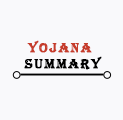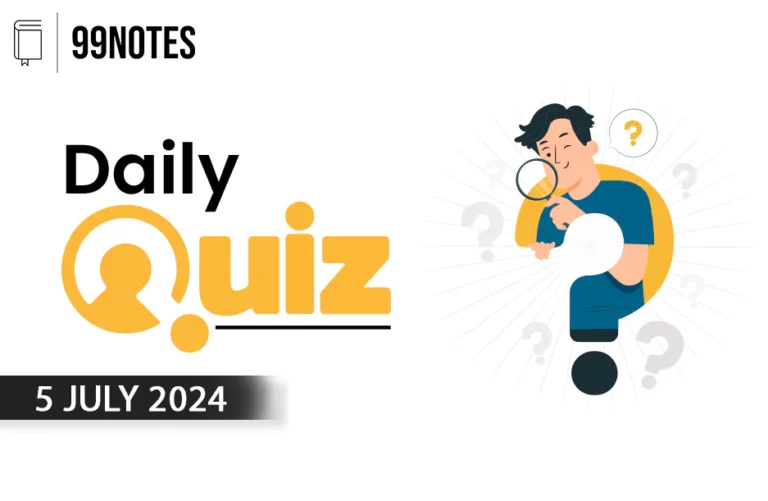17 Feb 2024 : Daily Current Affairs Quiz
Wrong shortcode initialized
Join 99Notes IAS Institute
Get A Free Counseling
By Our Professional UPSC Counsellors.
Daily MCQ: February 17, 2024.
- Which of the following is the primary legislation in India regulating foreign exchange and payments, aimed at facilitating external trade and payments?
Select the correct option from the following:
- Companies Act
- Income Tax Act
- Foreign Contribution (Regulation) Act
- Foreign Exchange Management Act (FEMA)
Answer: Option D – Foreign Exchange Management Act (FEMA)
Explanation:
- FEMA is the primary legislation in India that governs foreign exchange and payments.
- Enacted in 1999, FEMA aims to facilitate external trade and payments, regulate foreign exchange transactions, and promote the orderly development and maintenance of the foreign exchange market in the country.
- It replaced the Foreign Exchange Regulation Act (FERA) and has since been instrumental in managing India’s foreign exchange reserves and fostering a conducive environment for international trade and investment.
- In the context of Minimum Support Price (MSP) in India, what is the primary purpose of the Price Support Scheme?
Select the correct option from the following:
- To regulate the prices of agricultural commodities in the open market.
- To provide financial assistance to farmers for crop diversification.
- To facilitate export of agricultural produce to international markets.
- To ensure that farmers get a minimum assured price for their produce when market prices fall below the MSP.
Answer: Option D – To ensure that farmers get a minimum assured price for their produce when market prices fall below the MSP.
Explanation:
- The Price Support Scheme (PSS) in India is designed to provide a safety net to farmers by ensuring that they receive a minimum assured price for their agricultural produce when market prices fall below the Minimum Support Price (MSP).
- Under this scheme, the government intervenes in the market to procure the agricultural commodities at MSP, thereby supporting farmers and stabilizing prices during periods of market fluctuations.
- This mechanism aims to safeguard farmers from market uncertainties and ensure a minimum income for their produce.
- What is the primary motivation behind India’s investment in the development of the Chabahar port and associated infrastructure?
Select the correct option from the following:
- To compete with China’s Belt and Road Initiative in the region
- To exclusively boost India’s maritime trade with European countries
- To counteract the influence of the Gulf Cooperation Council (GCC) in the Middle East
- To establish a strategic trade route and provide access to Afghanistan and Central Asia while bypassing Pakistan
Answer: Option D – To establish a strategic trade route and provide access to Afghanistan and Central Asia while bypassing Pakistan
Explanation:
- India’s investment in the development of the Chabahar port is primarily motivated by the strategic aim of creating an alternative trade route to Afghanistan and Central Asia that bypasses Pakistan.
- This initiative aims to provide India with access to the landlocked regions, particularly Afghanistan, reducing dependence on routes through Pakistan.
- While other considerations may play a role, the key focus is on establishing a reliable and secure trade corridor for regional connectivity and economic development.
- What does Compulsory Licensing primarily enable governments to do in the context of patents?
Select the correct option from the following:
- Force all companies to obtain licenses for their inventions.
- Automatically grant licenses for all intellectual property.
- Mandate licensing of trademarks for consumer protection.
- Grant permission to produce essential medicines during public health emergencies without the patent holder’s consent.
Answer: Option D – Grant permission to produce essential medicines during public health emergencies without the patent holder’s consent.
Explanation:
- Compulsory Licensing allows governments to grant licenses to third parties to produce essential medicines, especially during public health emergencies, without the need for the patent holder’s agreement.
- This provision aims to ensure timely access to crucial medications, promoting public health, and addressing situations where the normal patent process might hinder the availability of life-saving treatments.
- Under which constitutional article is the provision for the National Commission for Scheduled Castes explicitly outlined?
Select the correct option from the following:
- Article 338
- Article 342
- Article 330
- Article 335
Answer: Option A – Article 338
Explanation:
- Article 338 of the Indian Constitution explicitly outlines the provision for the National Commission for Scheduled Castes.
- This constitutional article empowers the government to establish a commission to investigate and monitor matters related to the welfare of Scheduled Castes and to safeguard their rights and interests.
- The National Commission for Scheduled Castes plays a crucial role in addressing issues concerning the socio-economic development and protection of the rights of Scheduled Castes in India.
Here You can also attempt questions carefully developed by our team on those topics, which have high likelihood of being asked in the future exams, alongside the NOTES.








